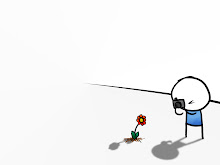3. Think about hamartia: find one poem that displays a tragic flaw in human nature (either human nature in general or in one human, as expressed in the poem). Write about whether or not the poem’s message is enhanced for you, as a reader, as you contemplate hamartia as it relates to the text.
The poem In the Secular Night shows hamartia through "you". This character that is portrayed throughout the story as one who is alone and this lonliness is what creates this sense of 'fall'. The author alludes to this lonliness as something that creates a separate outlet for the speaker, and people in general, to release that loneliness. The fact that she says, "…the sensed absence of God and the sensed presence amount to much the same thing…” brings up her point that this “…silence between the words” has become too much that she doesn’t feel the need to even believe anyone or any one ‘being’ is there for her. Then, the greatest portrayal of ‘fall’ is the last part of the third stanza when it reads, “Someone’s been run over”. This part could stand as a metaphor in saying that perhaps ‘all is over now’ or ‘nothing matters’ and that perhaps death is the only portal that will cease this loss in emptiness. The reader may approach the last line “The century grinds on” as a new journey into the future that proposes an opportunity for ‘redemption’ but to me, this only says that whether she expels this feeling of anxiety or not, it won’t matter, the world will continue to spin with or without her permission.
For me, this poem's message is enhanced for me as i contemplate hamartia in this text because I too have moments when I just need this lonliness. However, this doesn't mean that I have a craving to be recognized as the speaker in the poem is. I find that although being alone and having 'alone time' is healthy, sometimes being too alone and not being able to open up is unhealthy and unfruitful for any cause. For this reason, all may end in chaos like the last stanza portrays.
Monday, November 3, 2008
Subscribe to:
Post Comments (Atom)




No comments:
Post a Comment